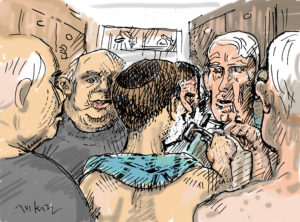Haim Watzman

“America is lucky,” he says as he smooths his hair and slaps his cheeks lightly. “To have Trump, I mean.”
But maybe I’m wrong. Bashan’s reverse image moves into my field of view just as I offer a weak smile and start on the stubble on the left side of my face.
“Right.” Bashan grimaces at his reflection. Where Lerner is steely, he is malleable; where Lerner has angles, he has arcs. A lot less hair, too, on his head, that is. Still, he must have been a looker back in the 1948 war, when they conquered the Negev together. Bashan had been a platoon commander in the Palmach’s Yiftah Brigade and Lerner one of his soldiers. I’d heard about it time and again in the shower.
“In our day,” Lerner’s reflection says as it adjusts the shoulders of its backward t-shirt, “the world had strong leaders who stood up for their countries. Churchill. De Gaulle. Roosevelt. Ben-Gurion.”
Bashan’s reflection leans forward at me and wiped a grain from its eye. “The Old Man.”





